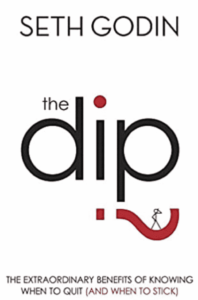The Dip: The extraordinary benefits of knowing when to quit (and when to stick)
I have a confession to make. I love Seth Godin. I have done since first discovering Linchpin many years back (maybe a book review for another day). His daily updates via Seth’s Blog keep me both inspired and amused in equal measure.
So, when The Dip came up in our business book club last month, I was pretty excited. I was also, however, slightly perplexed (and a little disappointed) that this book looked quite so short. It’s just 76 pages long.

Anyway, The Dip is all about quitting, and not quitting.
It’s about knowing when is the right time to quit something that isn’t going anywhere. But it’s also about keeping going with the right things, even when things feel incredibly tough.
Summary of The Dip
The real success goes to those that obsess.
Winners win big because the marketplace loves a winner. People don’t have a lot of time and don’t want to take a lot of risks.
The importance of being ‘the best in the world’ and what this actually means.
Seven reasons you might fail to become the best in the world:
- You run out of time and quit
- You run out of money and quit
- You get scared and quit
- You’re not serious about it and quit
- You lose interest or enthusiasm or settle for being mediocre and quit
- You focus on the short term instead of the long term & quit when the short term gets too hard
- You pick the wrong thing to be the best in the world because you don’t have the talent – ouch!
The Dip is ultimately what you’re going through when things get really tough and you feel like quitting.
In theory, it’s easy enough to survive the dip. However, you get what you deserve when you embrace the dip for the opportunity that it really is. Especially as many others falter at this point.
Is the pain of the dip worth the light at the end of the tunnel? If not, quit. Or even better, don’t start in the first place
He also mentions the cul-de-sac – dead-end. Quit as soon as you can!
Never quit something with good long-term potential, just because you can’t deal with the stress of the moment.
Points from The Dip that resonated most with me
“Winners quit all the time. They just quit the right things at the right times”
“If you don’t believe you can make it through the dip, don’t start in the first place”
Strategic quitting is a conscious decision you make based on the choices available to you.
“The opposite of quitting is rededication” – that renewed source of inspiration and motivation that can be useful to power on through.
Three Questions to Ask Before Quitting:
- Am I panicking? Quitting when you’re panicked is dangerous and expensive. The best quitters decide in advance when to quit. Wait until you’re done panicking to decide.
- Who am I trying to influence? If you have a well-defined person you’re trying to influence and they’re not listening, it may be time to quit. But when it’s a whole market, there are plenty of other people you could try to influence. Influencing a market is a hill you have to climb.
- What sort of measurable progress am I making? If you’re trying to succeed in a job or a relationship or at a task, you’re either moving forward, falling behind, or standing still. There are only three choices.
My evaluation of The Dip
I know I’m biased, but I wasn’t disappointed by The Dip. There are some priceless points here.
It’s nice and short – I realize now that Seth managed to get his points across succinctly and didn’t need to write a big long book on this one. I’m sure we’ve all encountered authors that have made that mistake…
Listening on Audible, it’s less than 2 hours (even less if you speed it up) so it’s definitely one I’ll be listening to on a regular basis now it’s in my library…
Especially when things get tough, as they inevitably do, from time to time. Or when I’m contemplating starting something new, but not sure if it’s worth the bother.

The Dip by Seth Godin
If you need any help deciding whether you should keep on going or quit an activity, Blue Diamond can help you to take control of your working life.

